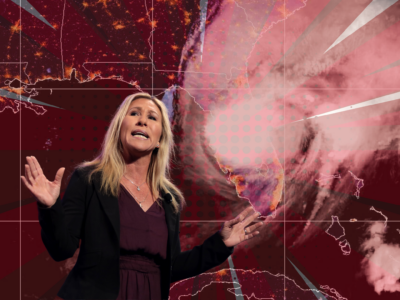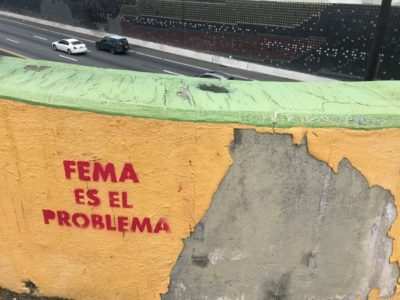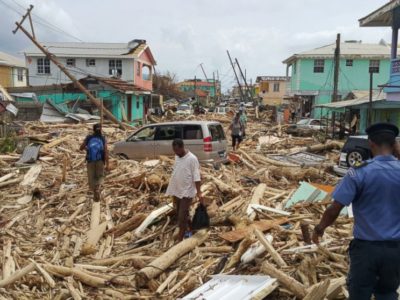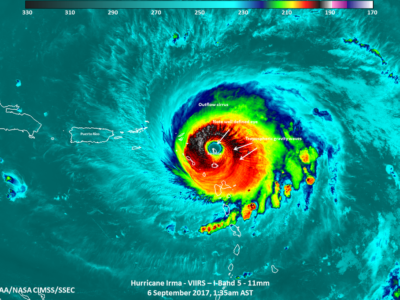Hurricanes
Reflections on “Yes they can control the weather.”
Marjorie Taylor Greene is wildly wrong about government scientists controlling hurricanes. There is a rich history of weather modification experiments that make that false claim more dangerous.
Since U.S. Rep. Marjorie Taylor Greene tweeted earlier this month that “Yes they can control the weather” — a bunch of commentators have pointed out that she’s wildly wrong. Yes, she’s wildly wrong. No one can make, intensify, or steer hurricanes. No ability to do anything like this is even on the horizon. Her comment …
Continue reading “Reflections on “Yes they can control the weather.””
CONTINUE READINGThe Walz-Vance Debate and Environmental Policy
After Hurricane Helene, Vance and Walz were pressed on climate change during the VP debate. Here’s everything they said on energy and the environment.
The subject of climate-fueled disasters figured prominently in the vice presidential debate. The CBS News moderators asked a question about climate change within the first few minutes, although the multi-faceted answers weren’t always factual and much of the post-debate discussion in newsrooms and spin room interviews centered on contentious yet civil exchanges on immigration and …
Continue reading “The Walz-Vance Debate and Environmental Policy”
CONTINUE READINGWe’re Going to Need a Much Bigger FEMA
FEMA is built to handle one disaster at a time. That’s not going to work in the future.
“When troubles come, they comes not as single spies but as battalions.” That wisdom goes back to Shakespeare. Yet our disaster response system is keyed to handling single disasters, not clusters of major disasters. That needs to change. This week is a good illustration. We have fires in California that may set records. We have …
Continue reading “We’re Going to Need a Much Bigger FEMA”
CONTINUE READINGGuest Blogger Cliff Villa: Es FEMA El Problema? Hurricane Maria and the Slow Road to Recovery in Puerto Rico
Strolling west on Calle Loiza from the Ocean Park neighborhood of San Juan, Puerto Rico, you could miss the devastation wrought by Hurricane Maria last September. Here in early May 2018, runners and walkers lap the track at Parque Barbosa while middle-aged men try to keep pace with younger guys on the sheltered basketball court. …
CONTINUE READINGDisastrous Inequality
Puerto Rico was hit much harder than Houston. But help was much slower coming.
Texas and Puerto Rico both got hit very hard last year by major hurricanes. But the federal government moved a lot more quickly to get help to Texas. In a new paper, I document the difference and explore the reasons. Although I won’t go into all the details here, this is a situation people need …
Continue reading “Disastrous Inequality”
CONTINUE READINGThe Hurricane Outlook
The journalists are sure about the 2018 hurricane season. The scientists? Not so much.
I’m actually in Puerto Rico today for a conference on the situation here after Hurricane Maria. Since hurricanes are on my mind, I wondered what the forecast for this year looks like. As it turns out, the headlines give significantly different takes on what to expect. Here is a sample of news stories, all issued …
Continue reading “The Hurricane Outlook”
CONTINUE READINGKatrinas Yet to Come
Climate change is expected to increase hurricane damage by $40 billion per year by the end of the century.
CONTINUE READINGExtreme Events
I spent yesterday at a conference at RFF on managing “tail risks” — the low-probability but extreme events that are on the tail of the probability distribution. Some probability distributions have what are called fat tails, meaning that the extreme events are more likely than you would expect from a normal distribution. One way of …
Continue reading “Extreme Events”
CONTINUE READINGNew and Noteworthy in the Eco-Blogosphere
For the environmental world at large, here are some noteworthy posts: Africa needs substantially scaled-up finance, technology and capacity-building to combat climate change 2009 Hurricane Names to Watch for, as Season Begins After a record-breaking 2008 hurricane season, the first storm has formed before the official June 1 start to the 2009 season. The hydrogen …
Continue reading “New and Noteworthy in the Eco-Blogosphere”
CONTINUE READING









